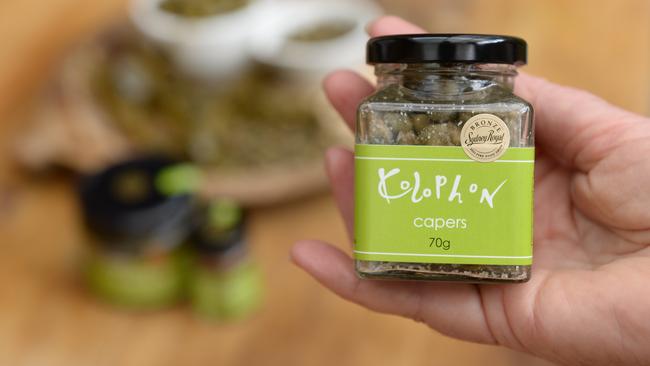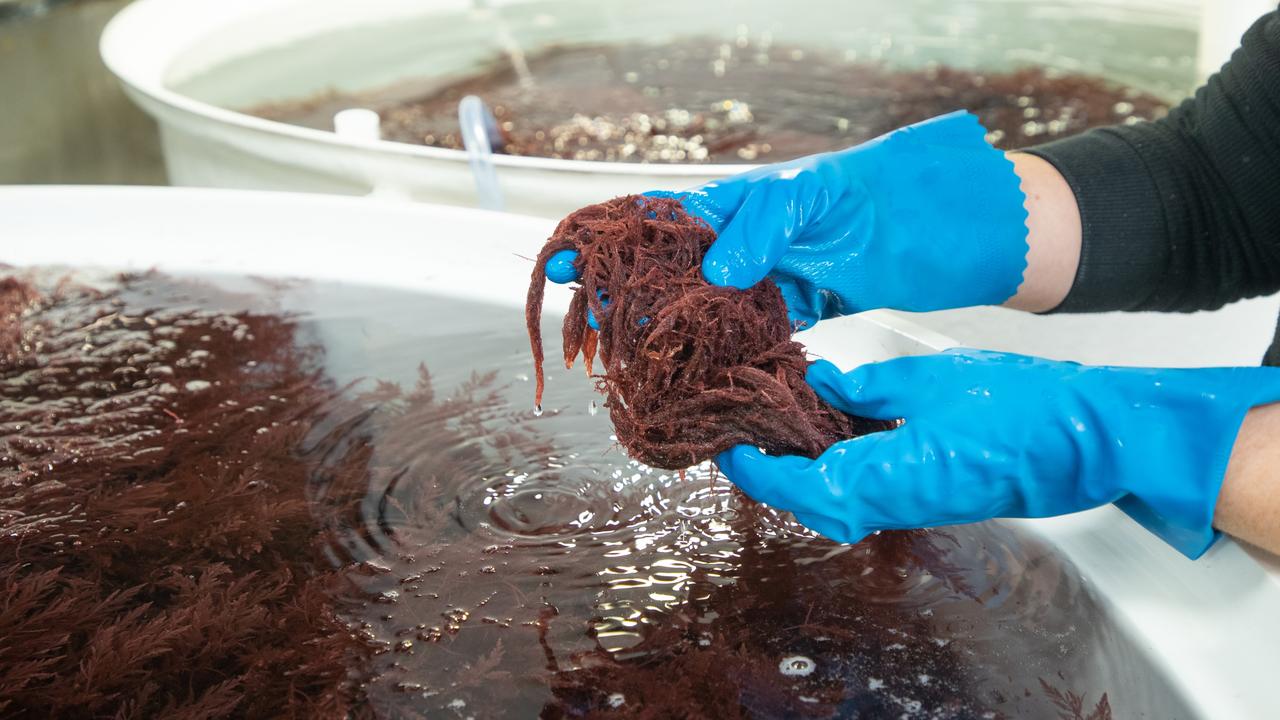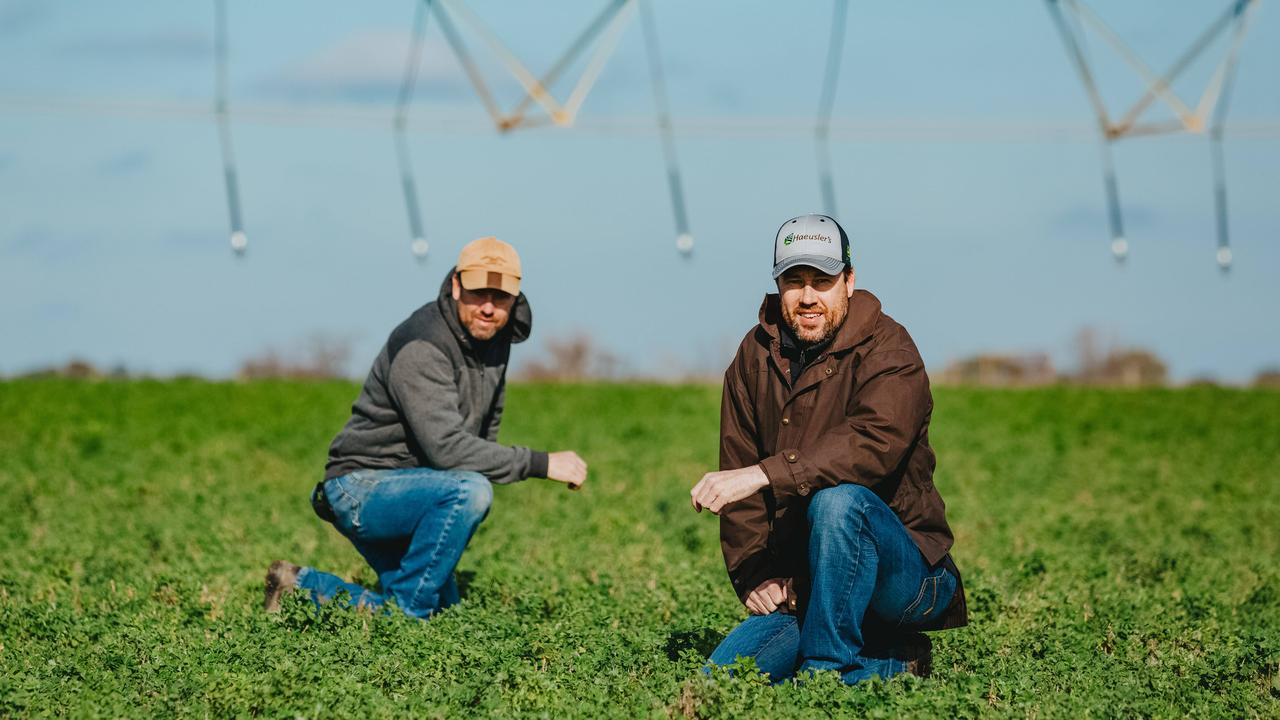Barry Porter and Helen Jones beat the heat with capers
THE bone-dry heat of South Australia’s Riverland gives caper growers Barry Porter and Helen Jones reason to smile.

IT WAS the last night of harvest and Barry Porter was about to put his feet up when he received a call from celebrity chef Heston Blumenthal’s restaurant, the Fat Duck.
“At first I thought it was one of my mates having me on,” Barry says, with a laugh. “But then I realised it was serious. The Fat Duck was wanting to serve our product.”
Really Barry shouldn’t have been too surprised, given the success of his Kolophon Capers farm, which he runs with his partner, Helen Jones.
Superstar chefs from George Calombaris to Simon Bryant and restaurants everywhere from Kangaroo Island to Byron Bay have all approached the couple to buy their award-winning capers.
Yet, still, success occasionally catches Barry and Helen unawares, located – as they are – far from the foodie hubbub on a barren, even hostile, patch of dirt in remote Mallee country in South Australia’s Riverland, between Berri and Barmera near the Victorian border.
“It does feel surreal,” Barry says. “We kick ourselves occasionally and ask ourselves how the hell did this happen.”
A little luck, in the form of positive media attention, may have helped Kolophon Capers’ success, but it’s ingenuity and hard work that have taken their capers from “peasant food to gourmet food” (as one Michelin-starred Italian chef described it).
Barry and Helen started farming capers in 2006 with 50 plants on a small patch of their four-hectare property. They now grow 250 plants and propagate up to 1000 each year.
Annual yield includes 150kg of buds and about 100kg of berries.
It speaks volumes of the couple’s ingenuity that they have developed a range of methods throughout the production line to differentiate their brand, from seed propagation to product development.
Alongside the buds and berries, which are pickled using a “dry salt” method, other products include pickled leaves, this year from 18,000 cut stems, an idea that came from Helen’s Turkish hairdresser. They also make 100kg of seasoning (a salt byproduct from pickling, which is then sun-dried), nibbles – ideal as a bar snack – and powder, sun-dried capers ground and blended.
“I’m looking at other products too,” Barry says. “The Turks and Greeks make a health-giving tea out of the flowers and the ancient Greeks used the bark and stems as wound dressings.”
When chefs asked for capers by size, Barry invented a grading machine that is able to sort capers into four sizes: less than 5mm wide, 5-7mm, 7-9mm and more than 9mm.
“The smaller ones are very strongly flavoured,” he says. “Some people would say harsh, but with a more peppery heat, whereas the larger capers have floral flavour overtones.”
Most of their products, about 65 per cent, are sold to chefs, with another 15 per cent each to the Riverland farmers’ market and through retail shops in the local area, as well as Adelaide and Brisbane.
Barry starts the growing year by taking seeds from the best plants and germinating them. Seeds are planted in trays and, six months later, re-potted into 50mm pots for one year, before being planted out in April or May.
Plants produce fruit at about age three, with maximum production after six years.
Capers are generally low maintenance, with Barry and Helen applying a mix of (non-certified) organic and biodynamic methods of production. The red Mallee sandy soil receives annual applications of their homemade compost, as well as a cup of organic fertiliser pellets and liquid fertiliser.
The only pest to threaten the crop is the caper white butterfly. The couple squash the butterfly eggs before they hatch or play “tennis practice” with the butterflies.
The Mallee region around their farm receives an average 200mm of annual rain, and the couple capture as much as possible in tanks.
While capers need little water, Barry says once a month in high summer they’ll get a dripper application of about 40 litres as a minimum.
“Each plant averages 1kg of buds when mature,” he says, “but if they get more water, they can produce a little more.”

Harvest runs from October to the end of March, with hand-picking of plants each week yielding about 6-10kg. If the weather is hot – above 36C – yield can double.
“Each bush takes about 15 minutes to pick,” he explains. “I sit down, I don’t bend over. I turn the radio on and often I’ll look up and see a kookaburra or a kangaroo. I start at first light and work for four or five hours.”
Once picked, capers and berries receive a dry salt pickle and leaves are pickled in a salt brine, in the on-site commercial kitchen.
“The salt used is a special blend of underground water salt, very mild in flavour with no usual harsh salt flavour,” Barry says.
Barry and Helen both grew up on fruit properties in the Riverland, Helen becoming a teacher and Barry a metallurgist for BHP.
In the early 1980s they yearned for a quieter life and bought four hectares of Mallee scrub.
“We wanted something that was out of town (10km from Berri) but not on a fruit block,” Barry says. “Everyone thought we were bonkers.”
Helen continued to work and Barry changed careers, working for 37 years for the South Australian Government in hydrology on the Murray River, retiring two years ago.
It was in 2006, with the prospect of retirement looming, that the couple decided to investigate farming options.
“We had a fairly tight set of criteria,” Barry says. “We needed a crop that would suit 45C summers and -8C winters, that was high value on a small area, needed virtually no water and something we could put our own stamp on.
“Our aim was to produce a high-quality product for a decent price.”
They visited a field day at a Mannum farm, then the only caper grower in Australia.
“About 80 people turned up, which put us off,” he says. “But as soon as they learnt capers had to be hand-picked, most people left. That’s when I got interested. I knew there would never be a glut on the market.
“We were looking for the perfect crop that would grow in the Riverland and we knew we had found it.”
They bought 50 plants that day.
“We were confident we could grow them. What we’d do with them was another matter.”
For three years Helen and Barry worked on developing a product, experimenting with different salts and pickling methods, trialling their results on friends, taking samples to parties and offering them to anyone who was willing to taste. Barry says once they landed on a winning formula, he began a method to propagate the field-grown, field-pollinated plants.
His internet research led him to a university professor in Turkey who taught him how to break the dormancy of caper seeds. “I had been cross-pollinating two of my best plants but was not having great results with germination of the seed,” he says. “The professor showed me a treatment method for the seeds.”
Barry says the method is a secret, but he now propagates about 1000 plants a year, for Kolophon Capers, as well as selling to gardeners who live in dry areas.
“There are not many plants that will grow virtually dry and flower for five months of the year,” he says.
By 2010, the couple were selling their first capers at the Riverland farmers’ market.
Barry says he broke into the chef market initially by attending food events and then, later, by winning such awards as the gourmet food awards in Delicious magazine.
“I was quaking in my boots approaching the chefs,” he says. “My job in government involved dealing with top-end bureaucrats and politicians where I could argue numbers. I used to be a shy person but that job gave me confidence, which I’ve used in this business.”
Now, Barry says, “chefs are coming to us” and they sell out every year.
“We’ve had some luck, but one person said chefs come to us because we have been around for the long haul. Too many people start with a product and two years later they’re not in business,” he says.
“And I believe, why leave anything standard when you can always improve on it?”
FARM FACTS - Kolophon Capers

Barry Porter and Helen Jones run Kolophon Capers on four hectares in South Australia’s Riverland, between Berri and Barmera.
They have 250 plants which produce about seven products including, buds, berries, leaves and powder. Annual yield includes 150kg of buds and about 100kg of berries.
They supply top-end chefs such as Heston Blumenthal and George Calombaris, while also selling at farmers’ market and through retail outlets.



